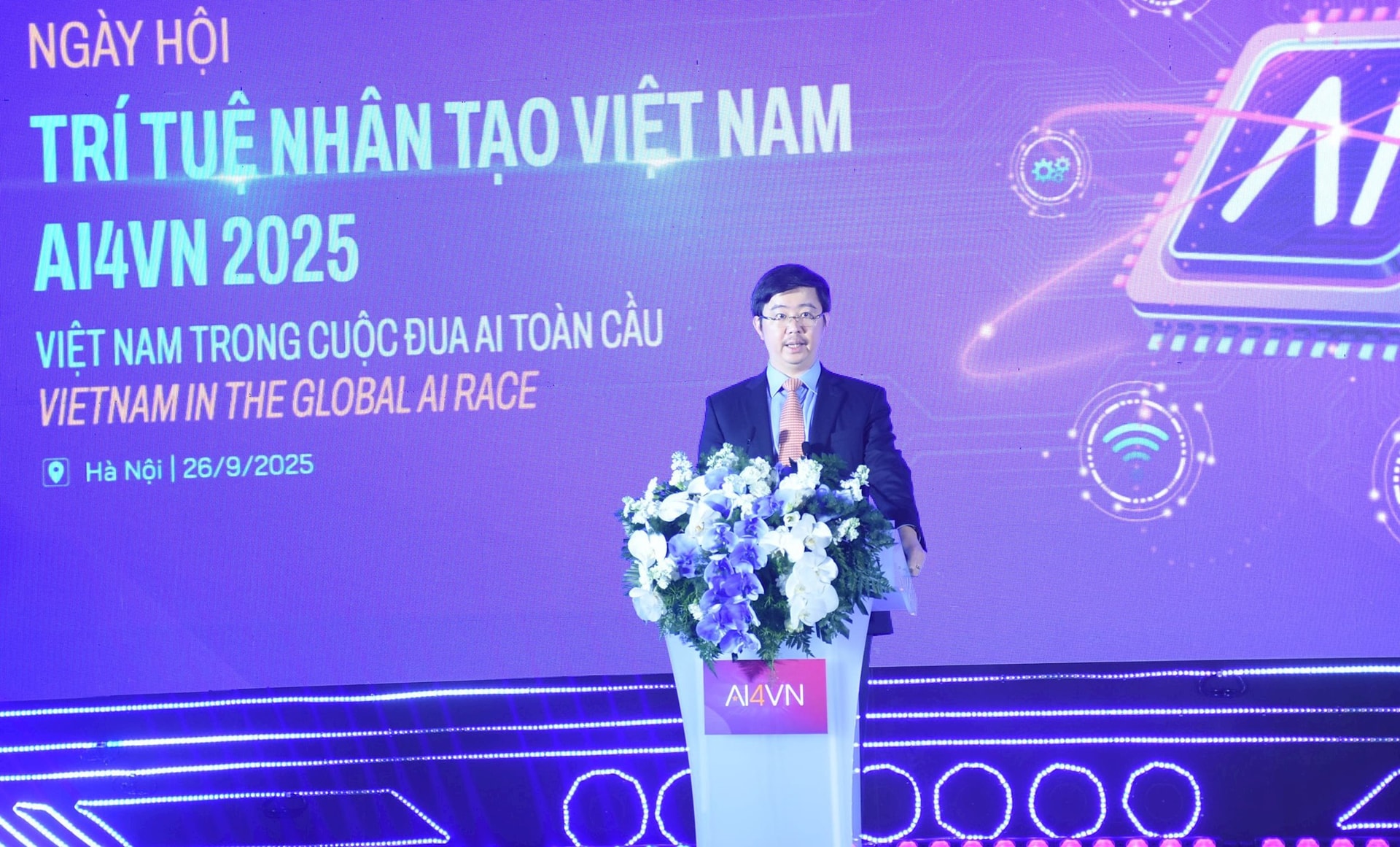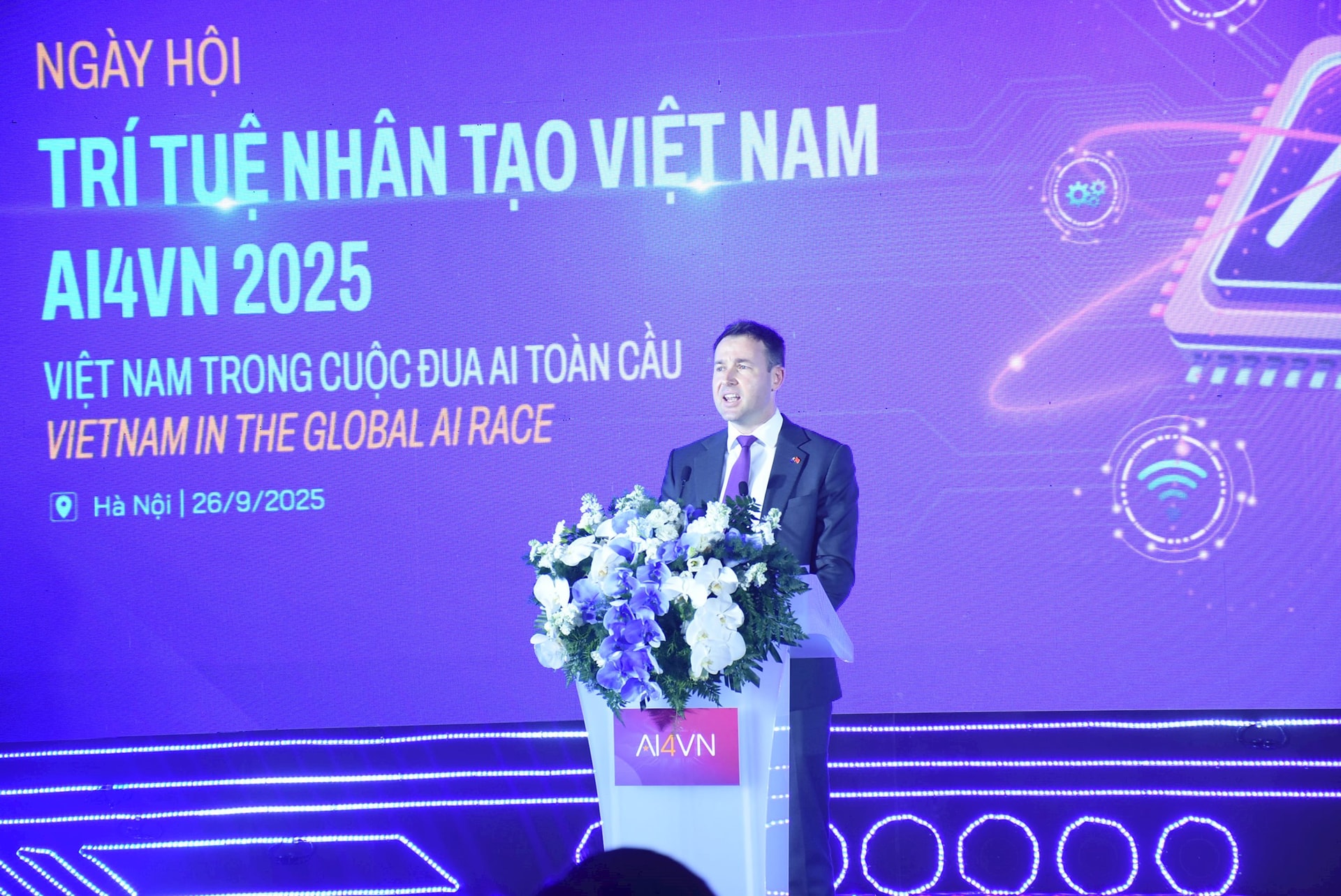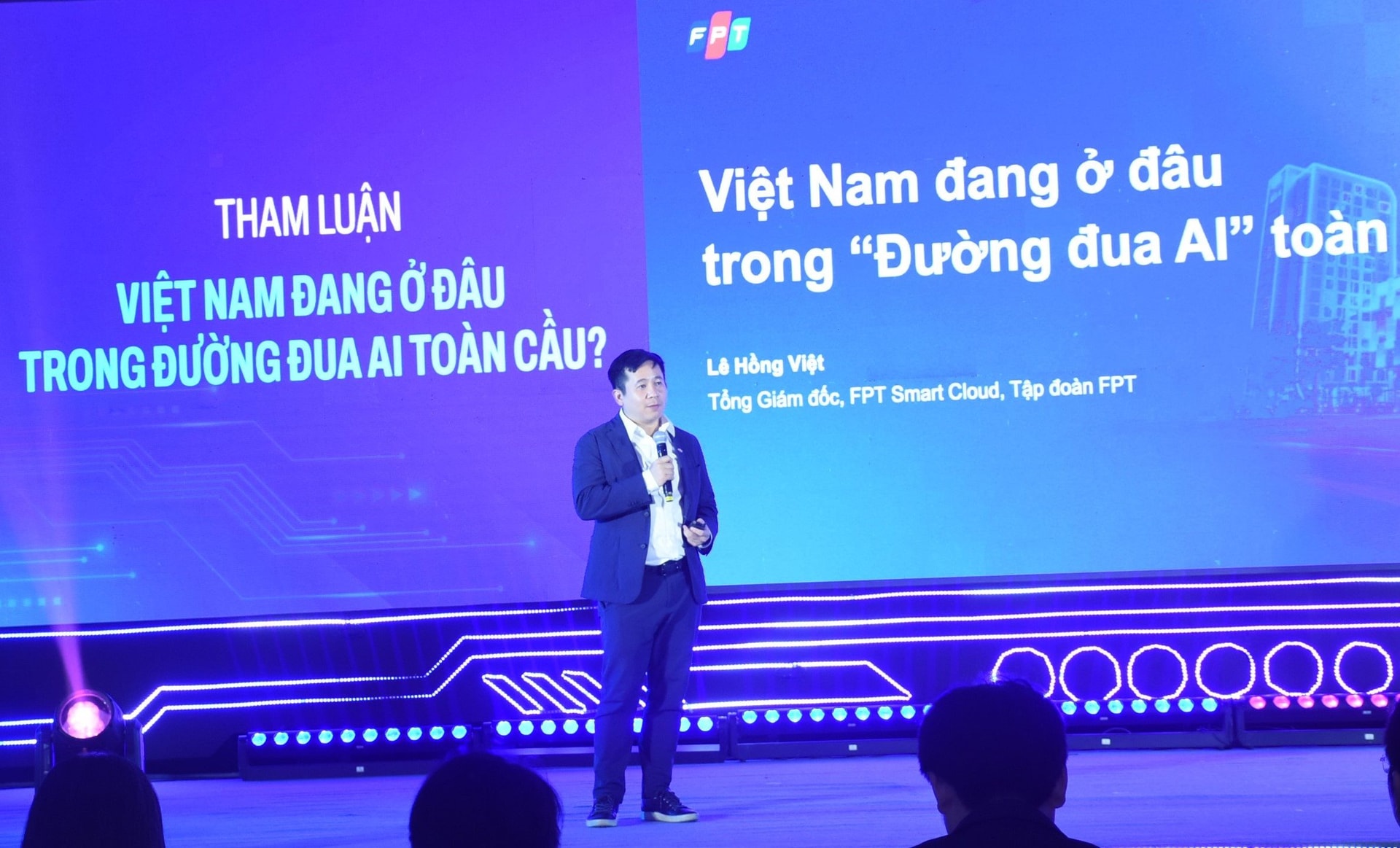The Ministry of Science and Technology continues to complete the legal framework to promote the development of an open, transparent, and effective AI ecosystem
Deputy Minister of Science and Technology Bùi Hoàng Phương stated that the Artificial Intelligence (AI) Law is expected to be submitted to the National Assembly by the end of 2025, positioning Vietnam as one of the few countries with a comprehensive legal framework for AI.
On September 26, at the National Conference Center in Hanoi, the Vietnam Artificial Intelligence Day (AI4VN 2025), organized by VnExpress, held its plenary session.
Under the theme “Vietnam in the Global AI Race,” representatives from regulators and businesses shared practical challenges and solutions to promote the application and development of AI in alignment with Vietnam’s national digital transformation and AI development strategies.
Artificial intelligence law expected to be submitted to the National Assembly by the end of 2025
In his opening remarks at AI4VN 2025, Deputy Minister of Science and Technology, Mr. Bùi Hoàng Phương shared key directions for building a legal framework for AI in Vietnam, affirming the country’s pioneering role in this field

Deputy Minister Bùi Hoàng Phương stated that the Artificial Intelligence Law is expected to be submitted to the National Assembly by the end of 2025, making Vietnam one of the few countries with a comprehensive AI legal framework.
The draft AI Law is built on core principles: human-centricity; ensuring safety and transparency; promoting inclusive and sustainable development; and balanced and harmonious governance.
One of the key points of the draft law is managing AI based on risk levels, in which high-risk AI systems must be subject to strict oversight. Transparency and labeling requirements are also emphasized, ensuring users are clearly informed when interacting with AI to address challenges in distinguishing human-generated from machine-generated content.
In addition to regulation, the law aims to foster development through special preferential policies for AI research and development.
AI ethics was highlighted as a central discussion topic. Challenges in education, healthcare, finance, and other fields require a clear ethical framework where humans retain final decision-making authority.
Deputy Minister Bùi Hoàng Phương also noted that the Ministry of Science and Technology is pioneering AI applications in internal operations, such as drafting legal regulations, significantly reducing workload and saving time.
The Deputy Minister emphasized that managing and developing AI requires a multidimensional approach, balancing innovation with protecting the rights of citizens and businesses. The role of experts, businesses, and state agencies is indispensable in this process.
“The Ministry of Science and Technology is committed to continuing to complete the legal framework to promote an open, transparent, and effective AI ecosystem”, Deputy Minister Bùi Hoàng Phương affirmed.
Australia accompanies Vietnam in developing responsible and sustainable AI
At the event, Mr. Kim Wimbush, CSIRO Counsellor and Director of the Aus4Innovation Program in Vietnam, stated that the theme of AI4VN 2025 reflects Vietnam’s vision of leveraging the Fourth Industrial Revolution to promote innovation and contribute to global progress. “Australia is proud to accompany Vietnam on this journey”.
According to Mr. Wimbush, the innovation partnership between Vietnam and Australia, launched in 2017 and strengthened since 2024, has made science, technology, innovation, and digital transformation as pillars of the comprehensive strategic partnership. The two sides have collaborated to ensure the responsible and sustainable development of new technologies, particularly AI.

The Aus4Innovation Program, funded by Australia’s Department of Foreign Affairs and Trade and co-managed with CSIRO and the Ministry of Science and Technology, has delivered tangible results. In Vietnam, AI has improved the accuracy of breast cancer diagnosis, enhanced agricultural production efficiency, and strengthened environmental management in national parks, contributing to the conservation of rare species like the red-crowned crane.
In addition to practical applications, the two sides have collaborated on developing ethical principles for AI. In June 2024, the Ministry of Science and Technology released Vietnam’s first responsible AI guidelines.
In 2025, the partnership will be elevated with the launch of the Australia-Vietnam Strategic Technology Center, focusing on 5G, 6G, cybersecurity, AI, and digital transformation.
“This is a significant milestone, affirming our commitment to supporting Vietnam in implementing Resolution 57 of the Politburo, making science and technology a driver of development,” Mr. Wimbush emphasized.
Vietnam’s position on the global AI map
At AI4VN 2025, Mr. Lê Hồng Việt, CEO of FPT Smart Cloud, FPT Corporation, analyzed Vietnam’s position on the global AI map, highlighting challenges, opportunities, and a roadmap for Vietnam to break through.

Citing reports from IDC and PwC, he noted that AI is projected to contribute $19.9 trillion to the global economy and increase global GDP by 15% by 2035.
The global AI race is dominated by two “giants.” The U.S. leads with 40 top AI models and $471 billion in private investment (2013-2024). China is rapidly catching up with 15 high-quality models, leading in patent numbers (over 817,800) and narrowing the gap in model quality.
In this landscape, Vietnam is considered an “emerging potential” in ASEAN, Mr. Việt noted. However, the investment gap is a significant challenge, with Vietnam’s AI investment far behind the U.S., China (56 times less), and even Singapore in the region.
Nevertheless, Vietnam has notable bright spots. A WIN (Worldwide Independent Network of Market Research) report ranks Vietnam 6th out of 40 countries in AI readiness. The domestic AI ecosystem is heating up, with $80 million in investment in 2024 (an 8-fold increase), a tech workforce of about 500,000, and high AI adoption rates (42% of the population, 65% of small and medium-sized enterprises).
Vietnam’s strengths include competitive costs, proactive government policies, and rapid economic growth. However, weaknesses such as uneven AI infrastructure, a shortage of high-quality AI talent, an incomplete legal framework, and modest R&D spending need to be addressed.
Based on these analyses, Mr. Lê Hồng Việt proposed a strategic roadmap for 2025-2030 to help Vietnam not only catch up but potentially lead the region. Titled “Building Sovereign AI,” the strategy focuses on four pillars: human resources, digital infrastructure, products, and ecosystems. The roadmap is divided into 3 phases: 2025 - foundation and preparation; 2026-2027- implementation and expansion; 2028-2030 - regional leadership.
“Vietnam has the opportunity to shorten the gap with AI power-countries if we quickly capture the regional market, focus on localized AI, and implement a comprehensive national strategy,” Mr. Lê Hồng Việt emphasized.
---
Translation copyright belongs to Vietnam Journal of Science and Technology (VJST).
